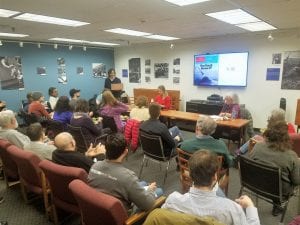After the election of Joair Bolsonaro, who sworn in as Brazilian 38th president on January 1st, 2019, academics all over the world have been analyzing the quick transformation of a former army captain and federal deputy for Rio de Janeiro (1998-2018) into an anti-establishment political phenomenon running the government of the largest economy in South America.
In response to this political and cultural scenario, Prof. Javier Uriarte in the Department of Hispanic Languages and Literature organized this February 20th a round table with historian Barbara Weinstein (NYU) –former professor at Stony Brook– and anthropologist Rosana Pinhero Machado (Federal Univ of Santa Maria, Brazil). The event was held in the renovated LACS seminar room.
Barbara Weistein on the past and present of Brazilian corruption
The lively Q&A led us into further conversations where we were able to make a ten minute video with historian Barbara Weinstein about corruption and its uses in Brazilian politics.
…nobody who has been participating in Brazilian politics since 1946 could possible claim to be free of any kind of corrupt involvement. So, I think, the structure of politics is such that escaping corruption in Brazil at this point in time is extremely difficult. That raises the question of what you do when you have corruption that is so wide spread and how do you gauge the corruption investigations that punish some people and not others? In my opinion, what it’s been going on in Brazil for much of the last five years is what some people have termed ‘lawfare’.
Hispanic Languages and Literatures thanks Barbara and Rosana for their visit to Stony Brook and generosity to share their research and ideas with our community.

